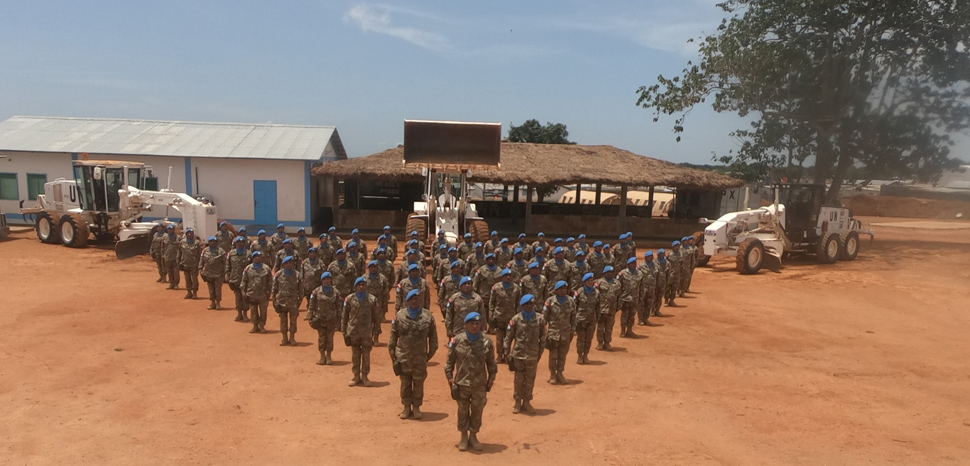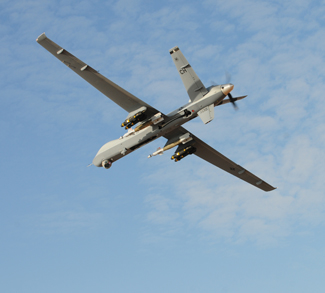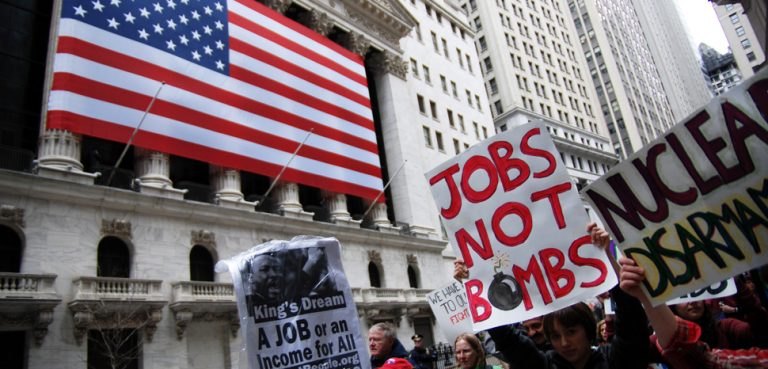The United Nations Multidimensional Integrated Stabilization Mission in the Central African Republic (MINUSCA) is a critical player in the affairs of the African nation, which faces internal instability due to several rebel movements, in addition to the coronavirus (COVID-19) pandemic. One of the contributing nations to MINUSCA is the Republic of Peru, which has a long history of participation in peacekeeping operations (PKOs).
In an exclusive interview with the author, Captain Jessica Chuquisengo Acosta of the Peruvian Army, explains the activities of the Peruvian engineering company (Compañía de Ingeniería Perú) that currently operates in MINUSCA, and the operations female peacekeepers carry out in particular.
MINUSCA and Peru
As of March, MINUSCA, headquartered in Bangui (the capital of the Central African Republic: CAR), has 13,252 personnel including slightly over 10 thousand contingent troops and over two thousand police officers.
The mission was first authorized on April 10, 2014 after the country collapsed into chaos resulting from the 2013 ouster of then President Francois Bozize by a Muslim-led insurgency (a coalition known as Séléka – meaning ‘alliance’ in the local Sango language) that led to acts of religiously motivated violence. A mixed force of French and African troops soon landed in the country in an effort to restore order. This force was then augmented by a contingent from the European Union.
As of May 31, Peru’s contribution to MINUSCA totals 204 contingent troops, six experts and nine staff personnel, for a total of 219 individuals, according to information available in UN Peacekeeping. The fifth contingent of Peru’s engineer company to the Central African Republic, led by Army Colonel Carlos Sánchez, was deployed this past January.
What do Peruvian Peacekeepers do?
The Peruvian engineering company’s tasks include clearing terrain; soil compaction and land leveling as part of the construction of aerodromes; maintaining, repairing and constructing airfields that are not asphalted; constructing and maintaining heliports; transporting equipment to construction areas, among others.
Captain Chuquisengo noted some of the projects that V Contingent has accomplished since its arrival to CAR, which included the construction of the Ghambia-Nofou road, and repairs to three bridges in Amada Gaza. Moreover, at the time of this writing, repairs are underway in the Bouar-Bossembele road; and a 15m pre-fabricated Acrow bridge is being installed in Bocaranga. Moreover, the Peruvian engineering company also provides logistical support for the transportation of water to refugee and dissident camps located within its area of operations.
One project that Peruvian blue helmets are currently carrying out, Captain Chuquisengo explained, is the construction of a heliport in Bouar (including three landing areas, space for taxiing, and other spaces) which will serve as the operational headquarters for a peacekeeping unit from Bangladesh. According to the Financial Express of Bangladesh the “Bangladesh Air Force (BAF) is going to send a contingent consisting of three armed Version MI-171 helicopters equipped with night vision systems and 125 personnel,” to MINUSCA.
As for the coronavirus pandemic, Captain Chuquisengo confidently remarks, “while it somewhat restricts our activities, it will not stop our operations, as we arrived to the Central African Republic with one objective and it will be accomplished.”
The future of female peacekeepers
The Peruvian engineering company in MINUSCA currently has 26 female peacekeepers. Captain Chuquisengo explained that among the contingent’s female military personnel there are officers, non-commissioned officers and technicians, as well as naval personnel; they include military engineers, a medical doctor, psychologist, military nurses, in addition to personnel that carry out other operations like communications, intelligence, translations, as well as administrative duties and logistical support in the command staff. She added that V Contingent has, for the first time, a legal expert who works a critically important issue: prevention sexual abuse and exploitation, and also manages civil-military cooperation with authorities of the Central African Republic.
Captain Chuquisengo argues that as a blue helmet in the Central African Republic, “I can observe how our participation is very relevant and helpful to CAR’s civilian population as I am in direct contact with the women and children” that they are helping. Moreover, she explains how “I can see how [local women] are more open and interact more with us [female peacekeepers]. This helps our operations, as we have created a sense of trust with them.”
As a personal anecdote, Captain Chuquisengo recalled how she was in charge of coordinating a project via which Peruvian engineers reinforced the infrastructure of a center that cares for children and teenagers. The improvements helped the center withstand the region’s torrential rains and also improved the facility’s access to potable water.
Moreover, as previously mentioned, along with peacekeepers from Bangladesh, Cameroon and Nepal, Captain Chuquisengo and her fellow Peruvian peaceekepers carry out activities to prevent sexual exploitation and abuse in the African nation.
Greater female participation in PKOs is a two-way street where all sides win. Not only does the local female population feel more at ease to voice some of their concerns to female blue helmets but, as the Peruvian peacekeeper notes, these operations help female blue helmets “value themselves more, [PKOs] helps them believe in themselves, without conforming, and it increases their self-confidence.”
When asked by the author why she decided to join MINUSCA, Captain Chuquisengo explained, while she was carrying out her military duties in Peru, she was offered the possibility to join this peace mission to expand her knowledge and experience in global affairs. “Also, as a woman, to have the opportunity to participate in such a unique experience at a personal and professional level and help areas in need find peace and security” was an opportunity she could not decline.
The Council on Foreign Relations, among other reputable institutions, have recommended increasing the number of female peacekeepers. A 2018 CFR commentary explains how “in Namibia, Rwanda, and South Africa, local populations perceived female police peacekeepers to be more effective at de- escalating potential violence, less threatening, and more receptive to civilians.”
CAR remains a complex theater
Scott Morgan, a Washington DC-based analyst that specializes in African affairs and president of Red Eagle Enterprises, explains that sometime during the month of June we will find out whether or not the United Nations Security Council will extend MINUSCA’s mandate for another year or wind up its mission.
The key question to keep in mind, Morgan explains, is: Has the situation on the ground improved, worsened, or has there been no change at all? One thing for certain is that like several other peacekeeping missions that are active around the world, this mission has had its fair share of controversy (including allegations of sexual abuse made against some MINUSCA peacekeepers). Nevertheless, there has been some success in restoring stability to the long-suffering country, Morgan adds.
In February 2019, hopes were raised as the CAR Government reached a deal with 14 rebel groups in an effort to restore peace to the country. The deal remains tenuous as sporadic reports of violence continue to emerge in remote areas. As a result, various humanitarian organizations, namely the Norwegian Refugee Council, Première Urgence Internationale, Search For Common Ground and War Child, recently suspended their operations in Bamingui-Bangoran prefecture, due to violence in the area.
Moreover, the UN flag does not make peacekeepers immune to violence since this past March a peacekeeper from Burundi was killed by anti-Balaka elements in Grimari, Ouaka prefecture. Overall MINUSCA has suffered 106 fatalities.
In spite of the loss so many peacekeepers, MINUSCA continues its operations to help the CAR government and protect civilian populations. In early April MINUSCA’s Zambian battalion from Gordil escorted CAR troops that were deployed to Birao (Vakaga prefecture) to bring peace back to an area that has suffered violent clashes with rebel forces in recent months. Then, in May, MINUSCA peacekeepers arrested a Seleka warlord, Azor Kalite, and eight of his troops.
Looking forward, Morgan explains that a key issue which will impact the peace deal with rebel groups is the country’s general elections, scheduled for this December. Since this election will be a transfer of power from one party to another there is the potential to either expose the country to new tensions or have previous fault lines reemerge and trigger new conflicts, explains Morgan. This is an underlying concern that could influence the decision by the Security Council regarding whether or not to extend the mission for either six months or another year.
Peru and the UN: A positive relationship
While MINUSCA is Peru’s largest current deployment, the country has also sent experts and staff to other UN missions, including the Democratic Republic of Congo (MONUSCO), Lebanon (UNIFIL), Darfur (a hybrid operation with the African Union, UNAMID), Abyei (UNISFA), Yemen (UNMHA), and South Sudan (UNMISS).
The country’s first major contribution to the UN mission was the famous Peruvian Battalion (Batallón Peru), which was assigned to UN Emergency Force II (UNEF II). This operation was carried out in the Middle East after the Yom Kippur War, also known as the 1973 Arab-Israel War (the father of the author was a Peruvian peacekeeper in UNEF II). Before MINUSCA, the Andean nation sent contingent troops to the now defunct UN mission in Haiti (MINUSTAH).
Overall, Peru has historically maintained a positive attitude toward participation in UN peace missions.
Conclusions
The situation in Central African Republic remains complex due to continuing violence and the new, pervasive threat of the coronavirus. In this complicated and dangerous scenario we find over twelve thousand peacekeepers assigned to MINUSCA, and with a growing number of female blue helmets, like Captain Jessica Chuquisengo Acosta, Peru is continuing its long tradition of participating in peacekeeping operations.
Being a peacekeeper is strenuous and dangerous work, and it is also a worthy, important cause—one that Peruvian military personnel have been a part of for a long time.
Wilder Alejandro Sanchez is an analyst who focuses on geopolitical, military, and cybersecurity issues. Follow him on Twitter: @W_Alex_Sanchez.
The author would like to thank Captain Jessica Chuquisengo, Peruvian Army; and Scott Morgan, Red Eagle Enterprises, for their assistance in this analysis.
The views expressed in this article belong to the author alone and do not necessarily reflect those of Geopoliticalmonitor.com or any institutions with which the author is associated.




